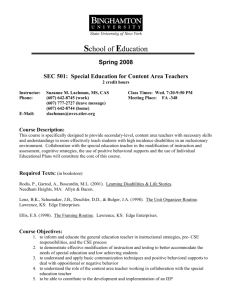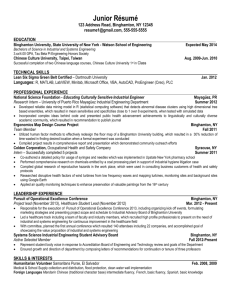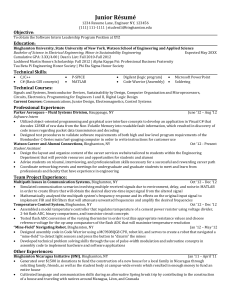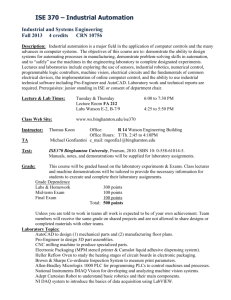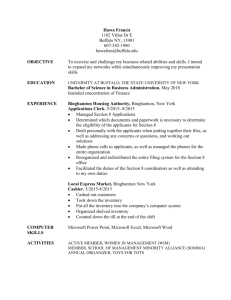Binghamton University
advertisement
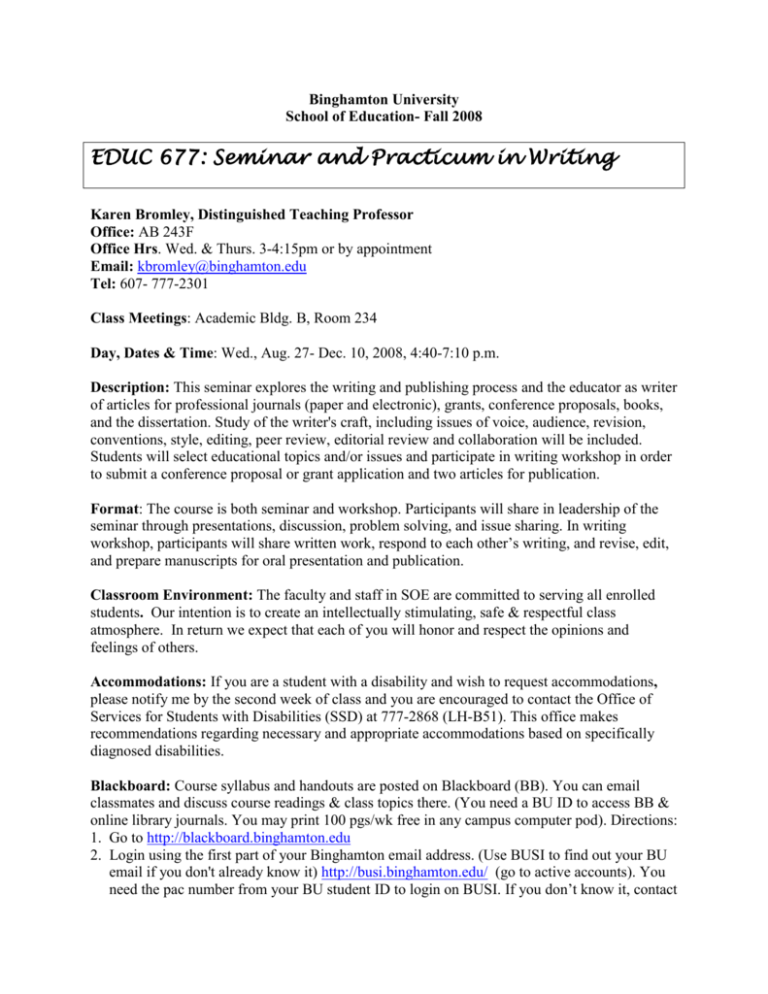
Binghamton University School of Education- Fall 2008 EDUC 677: Seminar and Practicum in Writing Karen Bromley, Distinguished Teaching Professor Office: AB 243F Office Hrs. Wed. & Thurs. 3-4:15pm or by appointment Email: kbromley@binghamton.edu Tel: 607- 777-2301 Class Meetings: Academic Bldg. B, Room 234 Day, Dates & Time: Wed., Aug. 27- Dec. 10, 2008, 4:40-7:10 p.m. Description: This seminar explores the writing and publishing process and the educator as writer of articles for professional journals (paper and electronic), grants, conference proposals, books, and the dissertation. Study of the writer's craft, including issues of voice, audience, revision, conventions, style, editing, peer review, editorial review and collaboration will be included. Students will select educational topics and/or issues and participate in writing workshop in order to submit a conference proposal or grant application and two articles for publication. Format: The course is both seminar and workshop. Participants will share in leadership of the seminar through presentations, discussion, problem solving, and issue sharing. In writing workshop, participants will share written work, respond to each other’s writing, and revise, edit, and prepare manuscripts for oral presentation and publication. Classroom Environment: The faculty and staff in SOE are committed to serving all enrolled students. Our intention is to create an intellectually stimulating, safe & respectful class atmosphere. In return we expect that each of you will honor and respect the opinions and feelings of others. Accommodations: If you are a student with a disability and wish to request accommodations, please notify me by the second week of class and you are encouraged to contact the Office of Services for Students with Disabilities (SSD) at 777-2868 (LH-B51). This office makes recommendations regarding necessary and appropriate accommodations based on specifically diagnosed disabilities. Blackboard: Course syllabus and handouts are posted on Blackboard (BB). You can email classmates and discuss course readings & class topics there. (You need a BU ID to access BB & online library journals. You may print 100 pgs/wk free in any campus computer pod). Directions: 1. Go to http://blackboard.binghamton.edu 2. Login using the first part of your Binghamton email address. (Use BUSI to find out your BU email if you don't already know it) http://busi.binghamton.edu/ (go to active accounts). You need the pac number from your BU student ID to login on BUSI. If you don’t know it, contact the Registrar's Office for instructions on how to obtain a replacement PAC (607-777-6871). 3. Your initial password should be the first two letters of your last name & the last four numbers of your Soc. Sec. #. You can change your password once you are logged in. 4. Once logged in you will see a list of your classes using BB & announcements. 5. Click on the class link you want to enter. From there you can view class documents Required Texts: Bromley, K. (Ed.) (2009). Writing for publication: Personal essays and practical advice: Needham Heights: MA: Christopher Gordon (will be provided for purchase in class). Recommended: Bolker, J. (1998). Writing your dissertation in 15 minutes a day: A guide to starting, revising and finishing your doctoral thesis. New York: Henry Holt. Booth, W.C., Colomb, G.C., & Williams, J.M. (2003). The craft of research, 2nd ed. Chicago: University of Chicago Press. Wepner, S.B., & Gambrell, L.B. (Eds.) (2007). Beating the odds: Getting published in the field of literacy. Newark, DE: International Reading Association. Articles and Chapters: Durst, R. (1992). A writers’ community: How teachers can form writing groups. Teacher as writer. K.L. Dahl (Ed.) Urbana, IL: National Council of Teachers of English, 261-271. Henson, K.T. (2007). Steps to excellence. Phi Delta Kappan, 88 (10). MacArthur, C.A., Graham, S., & Fitzgerald, J (Eds.) (2005). The handbook of writing research. New York: Guilford. (Selected chapters) Other Reading: Adams, K. The power of writing. Center for journal therapy. Retrieved July 7, 2006 from http://www.journaltherapy.com/power_of_writing.htm. Becker, H. (1998). Tricks of the trade: How to think about your research while you’re doing it. Chicago: University of Chicago Press. Becker, H. (1986). Writing for social scientists: How to start and finish your thesis, book or article. Chicago: University of Chicago Press. Eiben, T., Gannon, M. (Eds.) (2004). The practical writer: From inspiration to publication. New York: Penguin. Galvan, J.L. (2004). Writing literature reviews, 2nd ed. Glendale, AZ: Pyrczak. Laidlaw, L. (2004).Reinventing curriculum: A complex perspective on literacy and writing. Mahwah, NJ: Lawrence Erlbaum. Pipher, M. (2006). Writing to change the world. New York: Riverhead Books/Penguin. Publication Manual of the American Psychological Association, 5th ed. (2001). Washington, DC: American Psychological Association. Richardson, L. (1997). Fields of play: Constructing an academic life. New Brunswick, NJ: Rutgers University Press. Strunk, W., & White, E.B. (1979). The Elements of Style. New York: Macmillan. Wilcox, B. (2002). Thinking and writing for publication: a guide for teachers. Newark, DE: International Reading Association. Wilcox, B. (1996). Getting published: Private to public writing. The Reading Teacher, 49 (45), pp. 360-365. Websites of Interest: “Preventing Plagiarism”- http://library.lib.binghamton.edu/instruct/plagfaculty.htm “Graduate Level Writing Skills and Tasks”- (a tutorial with 21 modules- 6 hrs.) http://gradschool.binghamton.edu/ps/orientation/writing.asp ID:guest@binghamton.edu – Password: guest Grants & Funding Alert Newsletter. http://www.eschoolnews.com/gfa/gfa040108-67.htm Course Goals: Develop thinking about research and writing through assigned reading, presentations, and class discussion. Identify topics for professional writing based on personal knowledge, interests, strengths, and previous work. Learn about the craft of writing through reading, discussion, and writing that considers issues of purpose, audience, form, voice, conventions, and style. Compile journal submission guidelines and audience descriptions in preparation for submitting papers to educational journals. Use the writing process: planning, drafting, revising, editing, and proofreading to improve and refine your professional writing and create work for publication. Work in collaborative writing groups to respond to, edit, and proofread drafts of each other’s work to improve and refine manuscripts. Organize ideas in two cohesive manuscripts that maintain a consistent point of view, express ideas clearly, contain a critical perspective, and use appropriate guidelines for form and style. Create appropriate cover letters for two finished manuscripts and submit them for publication according to journal guidelines. Write a conference proposal according to specified guidelines. Establish a network of trusted colleagues as possible members of a future writing group.

